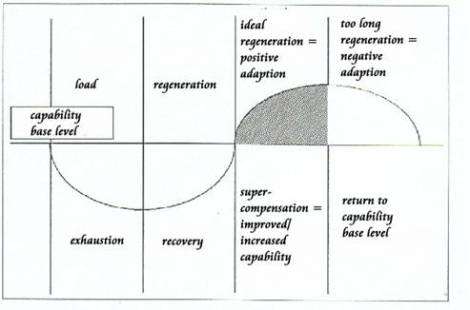Get stronger by spending less time in the gym? It sounds like a late night infomercial filled with scantily clad female fitness models touting the benefits of something like the Hawaii chair. I’m sorry to get off track, but I am comically obligated to post a video of the Hawaii chair: (Note: Though tempting, don’t go YouTube surfing after enjoying this video. There is quality information ahead, I swear.)
The Need to Deload
When training is broken down into a physiological process, the things that really matter are the stimulus (training) and the response to the stimulus (adaptation). In the search for a better physique or improved strength, the stimulus gets the most attention. Adaptation through recovery is an afterthought, but it shouldn’t be.
If exposure to a stimulus is prolonged then fatigue will be accumulated. If the fatigue is not managed and recovery is not emphasized then there will be no positive adaptation. This is where the deload comes in.
The goal of a deload period is to maximize recovery in response to a training stimulus so that there is a positive adaptation, the training effect is maximized, and improvement is attained.
The concept of a deload period though, is understandably a tough one for most gym junkies to grasp. The last thing anyone who has used strength training to change their body and their life wants to do, is stop training. Luckily there’s a way to get the benefits of a deload without a complete cessation in training. Here’s how.
Temporary Volume Reduction
This is tremendously effective from both a mental and physical standpoint. Cutting back on volume (sets, reps, number of exercises) while maintaining intensity (weight lifted) will allow for a maintenance exposure to the desired stimulus, while reducing the amount of stimulus needed to recover from. Even if recovery strategies aren’t changed, the volume of stimulus applied is reduced and therefore recovery should be enhanced.
This strategy is perfect for anyone not able to mentally function without training. Load the bar up, but don’t beat yourself into the ground.
I need to mention shortening a training session by increasing the density (same amount of work done in a shorter time period) will not produce the desired deload effect.
Here’s what how reducing volume improved my training this past week.
Exhibit A:
We train on a four day split (Monday, Tuesday, Thursday, Friday). We typically take Wednesday to do some technique work on our Olympic lifting and do a tough metabolic circuit. It usually turns into a full-blown training session. This past Wednesday I felt like roadkill, but I wanted to train something. I decided to reduce my volume and perform just a meager 6 sets of Behind the Neck Split Jerks and called it a day. Much to my surprise I worked up to a personal record on my last set and nailed it!
Those 6 sets were just enough for me to maintain/overload my strength and power and promote adaptation. That night I got my sleep, fueled up with some good food, and recovered. The next day’s training session was great, but I didn’t feel the effects of the adaptation from Wednesday’s workout until Friday.
Exhibit B:
Our training group has recently cut back on volume of Olympic lifting specifically, as mentioned in Teenage Girls and Training Updates. I have admittedly been experiencing some classic withdrawal symptoms (Olympic Lifting is a Hell of a Drug), and I was itching to do some Clean and Jerks on Friday. After a few light sets I knew this was going to be a good day. The reduction in weekly Olympic lifting volume was paying off in a big way.
70 kilos was light. 80 kilos felt too good. 90 kilos was challenging, but not enough to deter me from attempting to tie my personal record in the clean of 95 kilos. There was some trepidation on my part though. I had never jerked that weight before. I felt freakishly fresh for a Friday and decided to go after the personal record lift. Madness ensued!
I am confident in saying, that PR clean and jerk was brought to you by a deload period.
Lesson Learned: Precise manipulation, not complete overhaul, of training programs can help sustain progress and prevent injury. Everyone can use a deload period. Don’t believe me? Check this article from Eric Cressey talking about deloads, volume manipulaiton, and other ways to stay on top of your game: Strength Training Programs: 8 Strategies for Easily Maintaining Strength

